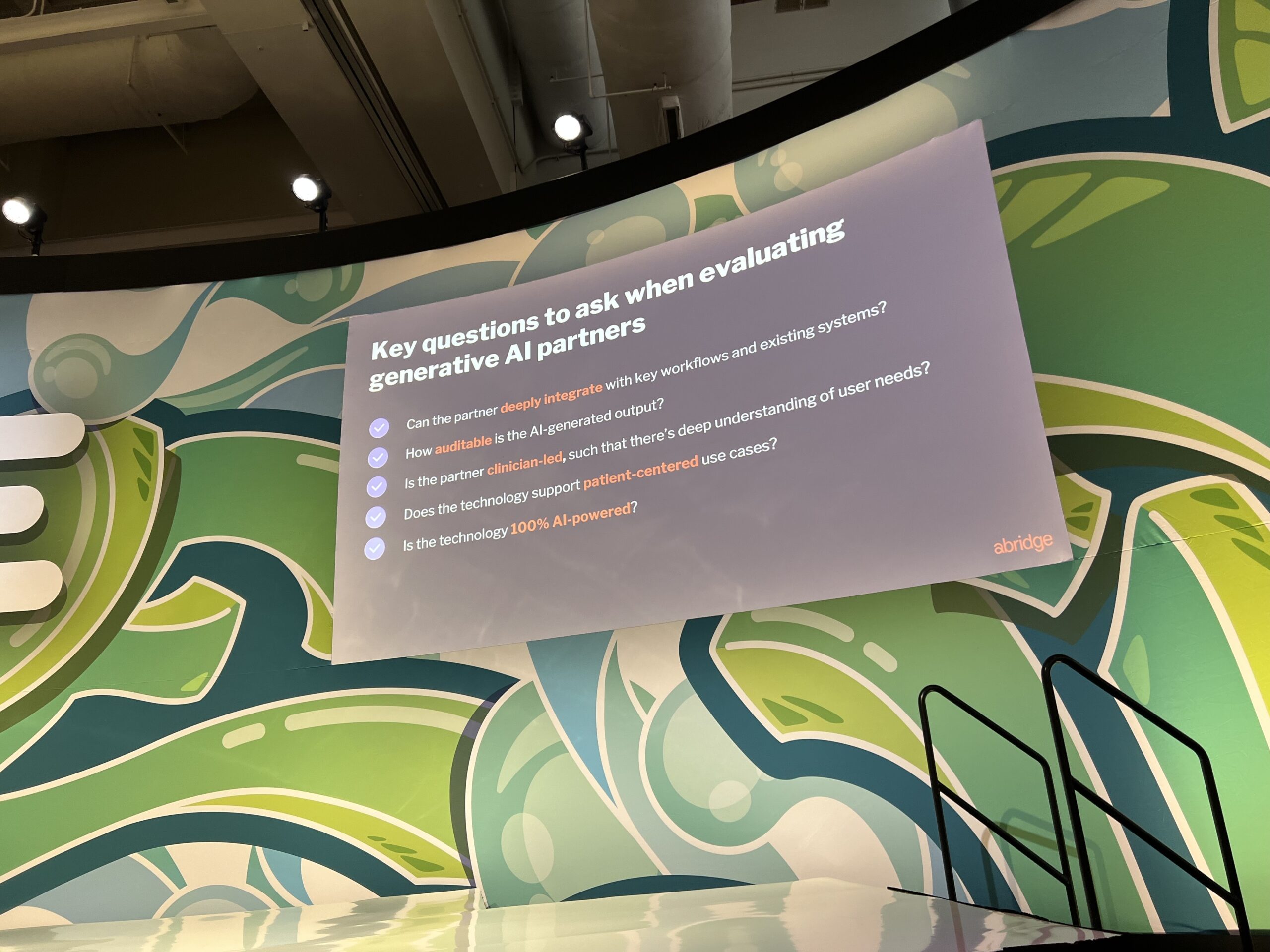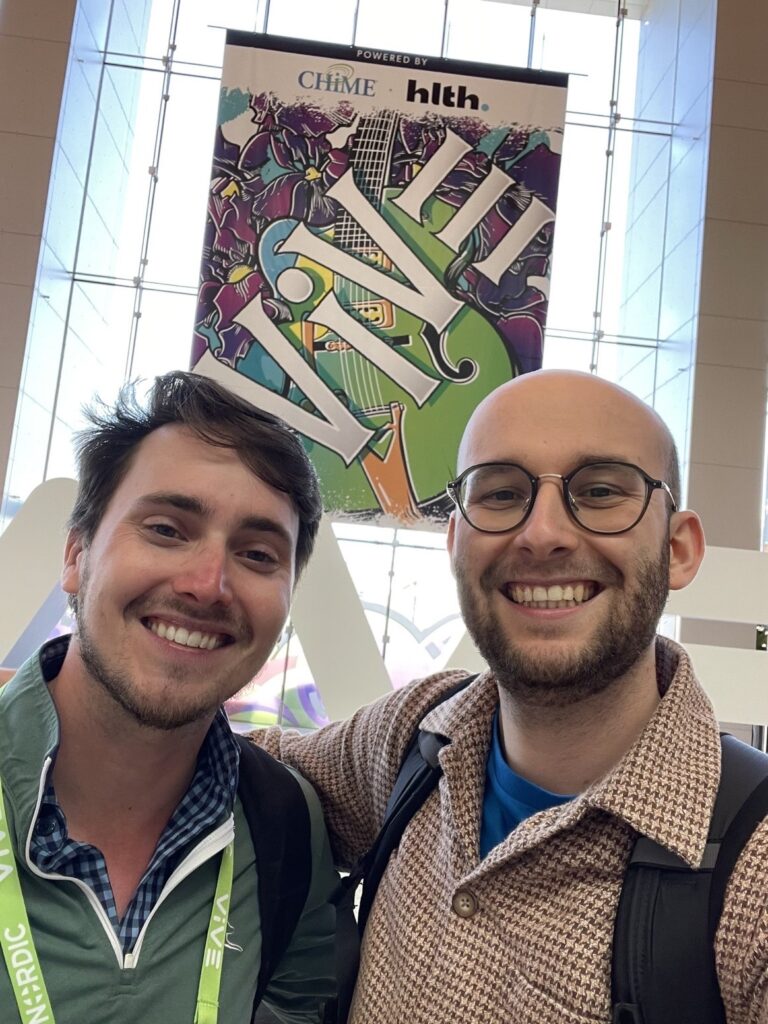A breath of fresh air swept through Nashville. Hundreds of companies and thousands of folks across healthcare stepped into the Music City Center for ViVE 2023.
I have to admit that I felt a bit apprehensive about running solo for my first healthcare conference. Running on fumes from a 5am Dallas flight, I rushed up to the registration stand. I found the station, turned to my left and…immediately ran into Jay Parkinson from Nabla in the flesh.
I knew then that ViVE would be a great time.
Enough about me, though. For much of the conference I was a fly on the wall listening in on interesting conversations, learning a whole lot, and seeing passionate founders connect with one another to advance innovation in healthcare. Here are some takeaways I had from ViVE 2023:
#1 AI in Healthcare is Buzzing, and ViVE was the Beehive

Ranging to everything from call center infrastructure support to identifying small polyps during colonoscopies, artificial intelligence has emerged as the frontier of innovation in healthcare. While others might think that AI will fully replace much in healthcare, my take is that AI will augment, not replace, existing infrastructure.

For instance, AI medical scribe firms might allow physicians to be 20% more productive while reducing burnout. It won’t necessarily replace the highly trained scribe, but rather optimize and save time to up productivity. AI in call center infrastructure may help call agents (who have high turnover rates) have better call satisfaction. AI deployed in case management may reduce length of stay in hospitals by a day or two providing clear ROI to systems (Alpine Health), or prevent a readmission based on social factors. And there are plenty of other use cases. But the main point is that full automation doesn’t seem to be here quite yet, and we need to think about the broader ramifications on jobs in the event that mass automation takes place.
AI is a feature, not a product. Since the tools are currently accessible to everyone, firms will have to find other ways to differentiate besides ‘being AI enabled’ which everyone, if they aren’t already, will soon be. Sophisticated use of AI – and how you train it – will be important.
What other areas of AI in healthcare are you exploring or interest you? I’d love to hear from the Hospitalogy fam.
#2 Continued shift away from growth at all costs into profitability and unit economics

Nothing really new here, but several panels on the main stage focused on macro economic uncertainty with the Silicon Valley Bank fallout in the back of many minds. Overall, there’s a prevailing cautious optimism for startups, but we should expect to see down rounds and consolidation over the coming months as fundraising dries up and takes longer while health systems have other strategic priorities to consider.
The focus has shifted from ‘How big is your valuation’ to ‘How can we survive the next 12-18 months?’
#3 Point solutions galore – how do they differentiate?
There was an emphasis and focus on B2B solutions at ViVE this year – not many direct to consumer companies attended. Or if they did, I didn’t see them around. What I DID see what an absolute cluster of companies across the event floor that seem to do really similar things. I also struggled to understand what certain companies ultimately did. That’s half the nature of the beast in healthcare, but also half on marketing copy and clearly delineating what your company does. I mean, if you’re a salesperson at one of these firms I have to think that you’re hard pressed to differentiate yourself from other companies.
I’d love to see and hear fewer buzzwords and more substantial statements around the product offerings, use cases, ROI examples, rather than the ‘Apple esque’ fluff. I know that probably won’t happen any time soon but I’d suggest tighter language around marketing slogans.
Final point, we don’t need all of these point solutions – and for that reason, consolidation is inevitable in many areas. CIOs are tired of the abundance of vendors and I’d expect a shift to bundled/partnered solutions.
#4 Rumor mill and some inside baseball
Some takes from the ViVE rumor mill and being a fly on the wall. I have no evidence to confirm or deny any of these claims but figured they’d be fun to share:
- Without knowing specifics, CVS apparently got a hell of a favorable deal investing in the Carbon growth round with major upside baked in.
- Ambient AI / medical scribe documentation is heating up as names like Abridge, Nuance, Augmedix, Ambience, and others fight over health system contracts. I heard through the grapevine about a bidding war happening in the space at St. Luke’s. Deep dive on ambient documentation coming soon™
- Microsoft and Epic are apparently planning a big announcement for HIMS including how Epic plans to leverage GPT-4 to automate dialogue within the EMR. An area worth watching.
- Intermountain’s venture arm is incredibly excited about the new launch of Culmination and has built a solid leadership team with a ton of experience in the space. A name to watch.
- Lavender, a startup providing mental health services, is cash flow positive at an 80 FTE headcount.
- Payors are making investors skittish with (1) MA rate changes; RADV stuff (we’ll see how things pan out in the final notice that’ll post Monday) and (2) utilization trend of GLP-1’s. It seems to be a bit more concerning than they’re letting on. CVS may be in the crosshairs.
- X = Primary Care is putting together something next level in a future product.
- Bessemer is releasing an update to its original health tech benchmarking study early next week – be on the lookout for it!
#5 What health systems and health tech vendors can learn from HCA’s Sam Hazen
HCA’s CEO Sam Hazen had some interesting commentary from his panel with Meditech’s Helen Waters. On his view on the pace of innovation in healthcare, he mentioned a tremendous opportunity toward data and digitizing the healthcare system, but caveated the take by saying that the tech companies with solutions have to find ways to immerse themselves in the process. Stated another way, vendors need to fully understand what the care teams and administrative personnel do, what the processes are, and then bring the solutions. Hazen specifically called out that HCA can’t do it themselves and that there’s a clear need for better processes.
Tech can solve a problem but if it doesn’t have a universal application and it struggles to scale beyond one or two hospitals, it’s hard for an organization as large as HCA to justify it. Hazen wants to see solutions that can scale easily across an organization. Easier said than done, of course.
Join the thousands of healthcare professionals who read Hospitalogy
Subscribe to get expert analysis on healthcare M&A, strategy, finance, and markets.
No spam. Unsubscribe any time.
Some other interesting points he made were around the provider workforce. Because the provider workforce is trending much younger, he can see the younger workforce as more flexible to change and technology, indicating an opportunity to leverage technology with clinicians who are more tech savvy.
On patients and consumerism, Hazen and HCA want to help patients navigate through the hospital – there are lots of connection points that don’t get connected seamlessly. Digital apps can create a more transparent processes for people, including more streamlined communication and education with patients.

Image Credit Gabriel Perna
#6 Personal Reflections on ViVE
As my first conference, I purposely kept my schedule light to get a feel for conferences and see what conversations naturally flowed. I think this ended up being a good move. It was a great time connecting with people I’d met virtually, putting my name & face out there a bit, and attending some interesting panel discussions (not ALL of them are corporate fluff, you can pick up some interesting tidbits).
I felt like I experienced a good balance of everything and am very appreciative of the folks who reached out to connect, or chatted with me at the conference. Special shout outs go to:
- Humberto Lee with Alpine for treating me to lunch and giving me a ride to the airport
- The Friends of Project Healthcare, specifically Eric Thrailkill and Lauren Hatcher for graciously hosting me on the podcast and being way too nice to me
- And everyone else I met and karaoke’d with (you know who you are).
Until next time!


